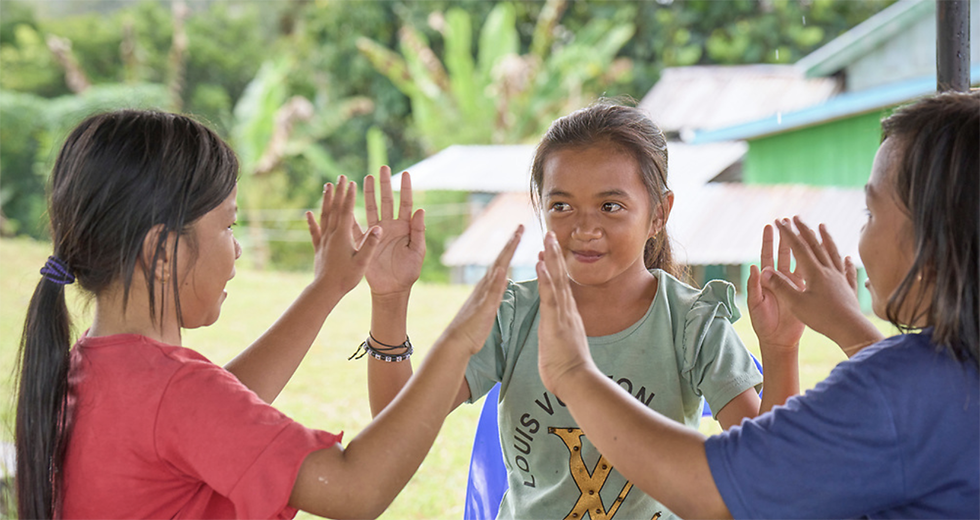Sharing and Nurturing Life from Eco Spirituality of Maano and Babalu

By Jenne Jessica Revanda Pieter
This liturgy is inspired by a traditions in Maluku, Eastern Indonesia, namely Babalu and Maano. Babalu and Maano are the traditional economic systems of the people of Central Maluku, which have solidarity values of sharing and preserving life. This Lent we are reminded that Jesus gave himself to atone for our sins. In the spirit of the value of sharing and preserving life through the Maano and Babalu traditions, we are also asked to become faithful as followers of Christ, to want to share and preserve life. In the midst of the current challenging times and in fighting for climate justice, the values in the Maano and Babalu traditions of sharing for solidarity and preserving life must be revived.
Ordination and Greetings
We are gathered as brothers and sisters to celebrate Lent
and remember His command to love and share.
In the name of the Father, the Lord of life,
Jesus Christ, the redeemer of life,
and the Holy Spirit,
God be with you, Amen.
And also with you.
Seek the LORD while He may be found; call on Him as long as He is near!
Hymn
I hear Thy welcome voice, That Calls me, Lord to Thee
For Cleansing in Thy Precious Blood That flowed on Calvary
I am coming, Lord, Coming now to Thee:
Wash me, cleanse me in the blood That flowed on Calvary
Scripture: Mathew 25:35-40
Reflection
The story of the text is familiar to all of us, Jesus calls into his Kingdom those who have fed, clothed, visited, and gave drink to the least, and Jesus goes on to call the least ones his brothers and sisters. The story has a strong theological point to make—that Christ is found among the least ones of the earth; they are the ones who are called his brothers and sisters. While in the passage Christ is also looked at as both a shepherd as well as a king, the point that Matthew actually wants to make in this story is that those two perspectives of Jesus are only secondary to the fact that he is the brother of the least, that the very least of the earth are his siblings, are his relatives.
This brings two immediate points into our focus: the one is that the economic justice crisis is integrally linked to the ecological justice crisis. We cannot separate economic inequality and climate justice. The poor are the most vulnerable to the ravages of climate change; the poor will suffer the ravages of extreme weather, heat waves, floods, and polar vortexes, while the rich will sequester themselves into their yachts and bunkers.
But the second point is that the Earth is herself among the least, the one who is suffering. Romans 8 rightly accounts for all of creation groaning for liberation. In our present circumstances, the earth is suffering; she is wounded.
In Indigenous visions of the cosmos, there is no separation between human life and nature; humans are a part of nature, and when we account for all our relatives, nature is also accounted for in this counting. In many cultures around the world the earth is referred to as mother.
Interestingly, in the “Canticle of the Sun,” the poem that was written by Francis of Assisi, the Earth is not called mother, but she is sister. Just as Jesus calls the very least his sisters and brothers, we should also recognize that the Earth is herself ravaged and that she is our sister.
Hymn
Ubi Caritas et Amor, Ubi Caritas Deus Ibi Est
Prayers of Intercession
God, guide us into your truth and teach us about your love
So that we can live this Lenten week by remembering your pure love, which frees us from all sin. And we live with your love
God, guide us into your truth and teach us about your love
So that we can learn from your love so that we are able to love others, and want to share with our neighbours
God, guide us into your truth and teach us about your love
So that we can advocate together with those who are poor and do not have access to life on their land
God, guide us into your truth and teach us about your love
So that we can help those who are victims of injustice in this challenging time
God, guide us into your truth and teach us about your love
So that we can fight together with Indigenous people all over the earth to protect this nature and be willing to learn from them
In the name of Jesus we pray, Amen.
Hymn
Lord Jesus Christ your light shines within us,
Let not my doubts nor darkness speak to me,
Lord Jesus Christ, your light shines within us
Let my heart always welcome your love.
Closing Prayers
God taught us about love. May Your spirit guide us to walk in the way of love, just as Christ loved us and gave himself up for us as a fragrant offering and sacrifice to God. We will live with God’s love, so that we will be able to love others and fight for all rights to life. Amen.
* This devotion becomes meaningful if an action of sharing is carried out
Rev. Jenne Jessica Revanda Pieter, S.Si, MA, Protestant Church in the Moluccas, Indonesia: Currently serving as a lecturer at the Theology faculty and officiate as a Secretary at the graduate school of Indonesian Christian University in the Moluccas. She is active in the field of ecology and advocacy for Indigenous people in central Maluku district.
This is the second in a series of Lenten devotionals focused on the climate crisis. Download the devotional booklet.
Image: Paul Jeffrey/Life on Earth
 World Communion of Reformed Churches
World Communion of Reformed Churches